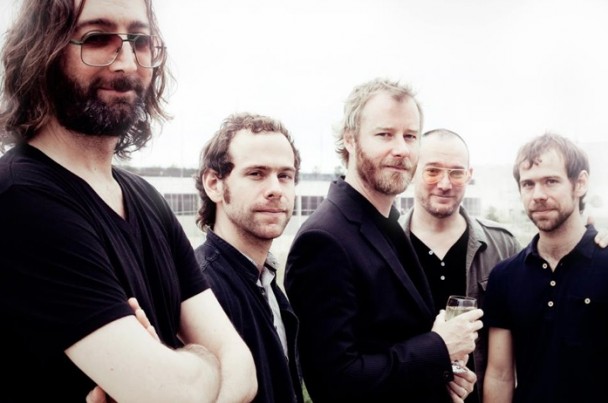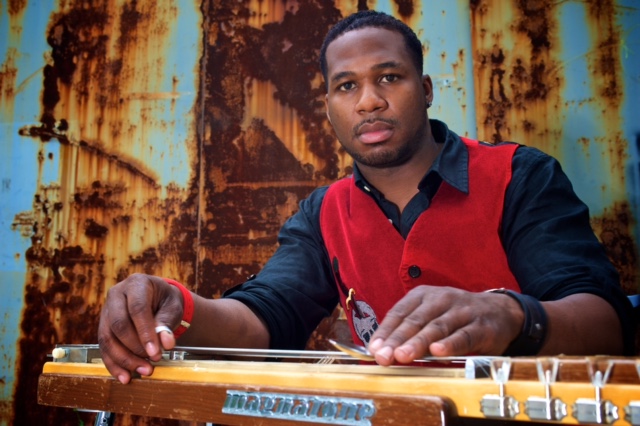
_Photo: Tracy Ketcher_
Iggy Pop, New Order, Robert Randolph, Nico Muhly and members of The National were among the acts who joined mainstay artists Patti Smith and Phillip Glass at the 24th annual Tibet House Benefit last night. The annual celebration of the Tibetan New Year and fundraiser for the US Tibetan cultural embassy once again took place at New York’s Carnegie Hall. The evening also boasted a surprise appearance by indie icon Sujfan Stevens, who both backed his friends The National and previewed his new collaboration with Muhly and National guitarist Bryce Dessner.
As has become a tradition, they kicked off with a short musical invocation by a group of Tibetan monks—adorned in traditional holy robes—as well as a formal introduction from Tibet House President Robert Thurman and the event’s musical curator, Phillip Glass. (Thurman’s daughter, actress Uma Thurman also serves as one of the benefit’s honorary chairpersons.) Glass mentioned early on that the Tibet House concert features a number of first time and surprise collaborations and almost every single set on last night’s program featured some sort of cross-pollination. Robert Randolph ushered in the evening’s collaborative spirit early on by opening the rock portion of the evening with a two-song set backed by Patti Smith’s current band (including longtime Patti Smith Group guitarist Lenny Kaye) and violinist Tim Fain. They settled in an area familiar with both Randolph and the garage-rock-leaning Patti Smith Group with a cover of Bo Diddley’s “Bo Dilley in A” and the blues-ramp “I’m Going Down.”
The National songwriting principals Matt Berninger (vocals) and Aaron and Bryce Dessner (guitars) anchored the evening’s second major segment. Offering a stripped down, heavily-orchestrated set, The National trio were backed by Stevens, Beirut trombonist and National contributor Ben Lands and the Tibet House’s veteran house string section, the Scorchio Quintet, throughout their set. Stevens played piano on the set-opening “I Need My Girl,” but passed his piano chair to Muhly for “This is the Last Time.” Muhly also joined in on The National’s third and final selection, “Vanderlyle Crybaby Geeks,” which in the pianist’s string original but never performed string arrangement on the song from 2010’s High Violet. After the rest of The National left the stage, Dessner, Stevens and Muhly previewed two songs from their new, classically-influenced solar system song cycle, “Planetarium” and “Neptune.”
The evening’s more orchestrated feel continued with a few pieces featuring Glass on piano. First, the renowned composer offered an interlude with Muhly called “The Chase” and then, he showcased the adjoining “France” and “The Pendulum” with Fain on violin. Tibetan folk artist Techung, another Tibet House concert album, also took the stage for a few songs that featured a mix of artists from his home country.
New Order served as something of a backing band for the evening’s most highly-anticipated and performance. The New Wave survivors—who Glass mentioned were on the benefit committee’s bucket list for many years—offered several rarities and one long awaited collaboration. (Though billed as New Order, technically last night’s version of the group only featured frontman and founder Bernard Summer and newer additions Phil Cunningham and Tom Chapman.) First, the group invited out UK poet Mike Garry for a unique spoken word ode to Factory Records Owner Anthony H. Wilson that meshed his “Saint Anthony” with New Order’s “Your Silent Face.” Then, proto-funk legend Iggy Pop joined New Order for the debut performance of “California Grass,” an outtake from their latest album, and two iconic numbers from New Order precursor Joy Division, “Transmission” and “Love Will Tear Us Apart.” Despite the formal setting, Pop remained true to his punk antics, placing his microphone down his pants and revealing his bare chest beneath his open jacket. The performance caused dozens of fans to rush the stage or dance in their seats. Adding to the collaborative spirit, Glass, the Scorchio Quintet and Smith drummer Jay Dee Daugherty. Pop remained onstage for a set of his own, which included “Sister Midnight,” “Nightclubbing” and a take on Glass’ “Mishima November 25th.” Smith’s backing band augmented Pop throughout his performance.
Smith, Tibet House’s most direct connection to the Downtown New York music scene that has provided so much of its talent during the past quarter century, closed the evening with a show-closing sequence. Her opening number was the most poignant—a cover of Tibet House mainstay Lou Reed’s “Perfect Day.” She also brought out her children for the poem “New Foal” and her erstwhile band for the rest of performance, including her take on “Gloria.” As always, most of the evening’s performers took the stage for an all-star version of “People Have the Power.”

_Photo: Tracy Ketcher_


No Comments comments associated with this post